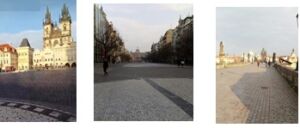Newsletter july 2020 : International Relations
 La Mobilité Internationale - The IR Department of the Faculty of Science listens to students during the Covid-19 confinement period.
La Mobilité Internationale - The IR Department of the Faculty of Science listens to students during the Covid-19 confinement period.
Faced with the health situation linked to the COVID-19 epidemic and the resulting national decisions to close university establishments and impose lockdowns, the University of Montpellier had to take measures to ensure the safety of all students and staff.
During this very exceptional period, the UM Faculty of Science's IR Unit was mobilized to take on new missions due to the unprecedented health situation created by Covid-19.
As soon as the lockdown was declared on March 17, 2020, the Pôle des Relations Internationales of the Faculty of Sciences at the University of Montpellier had to take stock of and identify all students on study/internship mobility abroad (200 students) and international students in Montpellier (120 students).
The next priority was to communicate with all students about the government's announcements concerning French and international students.
We also had to follow up on a daily basis with all French students still abroad, to ensure that their repatriation went smoothly. For those who had not yet left, mobility was suspended.
International students in supervised mobility in Montpellier have also been informed of the new announcements, allowing them to return to their country of origin if they so wish. However, we must remain vigilant regarding transport accessibility, border crossings and potential blockages.
During the period of confinement, the IR Department was on hand to help students with any queries they might have. The Head of the IR Department interacted on a daily basis with all students, partner universities and the management of the UM Faculty of Science.
"The Head of the International Relations Department had a very specific role to play during the first 4 weeks of the lockdown with students abroad. She had to interact with the support of the University of Montpellier's central services and the Faculty of Science on repatriation schemes for students, and listen to all French and international students throughout this period".
This experience, in a rather special period, was very intense - the global health crisis disrupted the mobility of students abroad and in France.
The IR department of the Faculty of Science was able to deal with the difficulties encountered by students throughout this very special period - the service also worked in close collaboration with all the IR coordinators of the various departments of the FdS to answer all the questions of all the students, and to support them in their endeavours".
Testimony of an exchange student in Covid-19 period
"As a student in the Biology and Ecology Department of the UM Faculty of Science, I went to Prague for two semesters as part of the Erasmus+ program. I had already been in Prague for six months when the virus arrived in the Czech Republic. Until then, I hadn't been too concerned about the situation in Asia, so I continued to go out and attend classes, and the only sign that an epidemic was underway was the Czechs' distrust of Asian tourists, who were not allowed into certain restaurants.
The Czech authorities were quick to restrict the flow from China and northern Italy. Nor did these initial measures make me aware of the seriousness of the disease, since they had no impact on our lives. Hence my surprise and incomprehension when nightclubs, the university, bars and restaurants and non-essential businesses were successively closed at the beginning of March, even though the country had fewer than 50 positive cases of the Coronavirus.
It was a very confusing time for us foreign students, as we didn't know whether to return to France as quickly as possible, or wait a few weeks for the situation to return to normal.
At the same time, online courses were being set up. At first, I decided to stay in Prague, where the situation seemed safer and to avoid traveling. But when we were informed by a Czech friend that the borders would also be closed and that a lockdown would be introduced, many people decided to leave in a hurry. The French embassy in Prague couldn't help us, as the health situation in the Czech Republic didn't justify repatriation. It was very hard psychologically to see all my friends leave and to find ourselves in a lifeless city. My parents were very worried and insisted that I be allowed to return to France. I was also afraid of being stuck in Prague for too long, so I bought a ticket for one of the last Prague-Paris flights, whose prices had rocketed. So I flew back to France.
I'd like to thank the FdS International Relations Department, which was very present throughout this period. I'd also like to thank my IR coordinator in the Biology and Ecology department for her support in all my endeavors and for ensuring my well-being until my return to Montpellier.
Back in France, I was able to follow the courses at the Prague faculty, and take the exams online. Although I was very disappointed to have returned two months too early, I have excellent memories of my Erasmus experience.
Personal photos taken during confinement. People were allowed to go out for a walk, but with their faces covered, on pain of a heavy fine. Nevertheless, Czechs remained confined to their homes.
The Old Town Square, Vaclavske namesti and Charles Bridge are usually packed with tourists.
Laëtitia
L3 Biology, Environment and Earth Sciences
Faculty of Science - University of Montpellier
